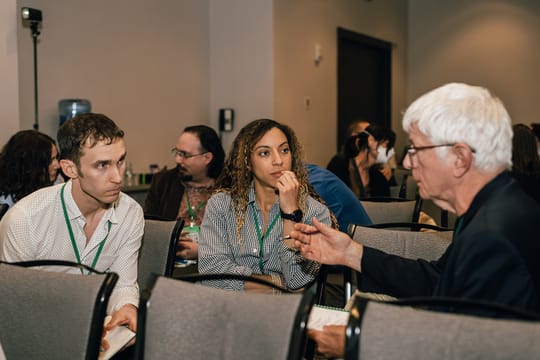Viewpoint
Diversity

Viewpoint diversity keeps the frontier of scholarly inquiry open in a lively way by enabling hypotheses to be challenged, disfavored but important research to be pursued, and knowledge to grow.
Viewpoint diversity means cultivating a wide range of perspectives on campus to ensure scholarly inquiry proceeds in an open and lively way. When scholars and students engage with people who think differently — across moral, cultural, and theoretical lines — they encounter new evidence, question assumptions, and sharpen their own reasoning.
However, when certain disfavored viewpoints are excluded via cultural norms, practices, or procedures, academic inquiry stagnates as flawed ideas go unchallenged, research questions go unasked, and classrooms become places of affirmation rather than discovery. The best scholars do not surround themselves with affirmation, but actively court disagreement. The most vibrant universities are not echo chambers dominated by groupthink, but arenas where ideas are tested, refined, and replaced.
For higher education to cultivate independent thinkers who advance the truth-seeking, knowledge-generation mission of the universities, students need classrooms where they are not steered toward a single dominant viewpoint — progressive, conservative, or otherwise — but are invited to explore all perspectives rigorously.
Viewpoint diversity is not simply about political affiliation, but rather is about fostering the scholarly conditions necessary for the pursuit of truth and knowledge.
Great Minds Think Differently
HxA president John Tomasi explains why viewpoint diversity is essential to education and how we can foster a campus culture that encourages it. In an era of increasing polarization, universities must remain spaces where students and professors can discuss controversial topics without fear. Discover how Heterodox Academy is leading the charge to bring open inquiry and viewpoint diversity back to higher education.
The concept of viewpoint diversity in academia has its roots in the Enlightenment ideal of open inquiry and intellectual pluralism. In the early modern university, scholarly debate and the exchange of competing ideas were seen as vital to knowledge creation.
However, by the mid-20th century, especially during and after the 1960s, ideological homogenization in certain disciplines led to growing concern about the narrowing of acceptable perspectives. Universities became centers of social and political activism, with movements for civil rights, feminism, and opposition to the Vietnam War energizing students and faculty.
While these movements helped advance moral progress, they also encouraged increasing ideological alignment within many disciplines, especially in the humanities and social sciences. Over time, this fostered a sense of orthodoxy around certain political or moral commitments and reduced tolerance for dissenting ideas.
HxA was founded in 2015 by a group of academics — psychologist Jonathan Haidt, law professor Nicholas Quinn Rosenkranz, and sociology graduate student Chris C. Martin — who observed that a lack of political diversity in social and behavioral sciences was negatively impacting the quality of research and teaching.
Since then, we’ve brought together over 8,000 politically diverse members across more than 2,000 academic institutions and nearly every academic discipline. Together, our members work to rigorously challenge each other, notice untested assumptions, imagine and explore new questions, and make continued progress toward truth — one classroom, one department, and one campus at a time.
As part of our Open Inquiry U agenda to advance viewpoint diversity on university campuses, HxA endeavors to:
- Broaden curricula, job postings, research agendas, and campus events.
- Search out and remove formal or implicit screens based on viewpoint in hiring, admissions, and evaluation.
- Reform systems and norms that promote self-censorship or discourage dissent.
Through their scholarship, teaching, and engagement, HxA members are renewing the spirit of viewpoint diversity on campuses worldwide
How To Teach Across Divides
What happens when students from different ideological backgrounds truly listen to one another? Philosophy professor and Heterodox Academy member Jennifer Townsend shares how she fosters civil discourse in the classroom—and why open inquiry and free speech are essential for real progress on campus. In this inspiring reflection, Jennifer explains how diverse viewpoints and respectful dialogue are changing the way students see the world—and each other.
Therapists Need Pluralism
How do you serve patients well when politics enters the room? Clinical psychologist Andrew Hartz explains how he saw clients misjudged for their beliefs, why that harms care, and how he turned to HxA for community, editing support, and platforms that helped him speak thoughtfully in public. That momentum eventually led him to found the Open Therapy Institute, which focuses on documenting how sociopolitical forces affect mental health and on helping clinicians handle tense topics with skill.
The Power of Diverse Perspectives
In this keynote lecture from the 2025 HxCanada Fall Conference, sociology professor, author, and HxA fellow Musa al-Gharbi takes a hard look at how diversity and knowledge production intersect. He shows why real pluralism is a scientific superpower, how monocultures warp what gets studied and what counts as evidence, and why many DEI tactics backfire.
- Filter by Format
- All Formats
- Event
- Blog
- Podcast
- Announcement
- Report
- Resource
- Video
- How Can We Get Viewpoint Diversity in Higher Ed+Viewpoint Diversity+Virtual only
- The Weekly: Viewpoint Diversity vs. Women’s & Gender StudiesFebruary 7, 2026+Nicole Barbaro Simovski+Viewpoint Diversity
- Scientists Are People — And Their Politics Can Show Up In Their ResultsFebruary 5, 2026+Dylan Selterman+Viewpoint Diversity
- S2 Episode 42: The University in the Age of AI: Rebuilding Trust, Truth, and Teaching | Kavita BalaJanuary 26, 2026+Kavita Bala+Viewpoint Diversity+Constructive Disagreement+Open Inquiry+Academic Freedom+The Free Exchange of Ideas
- How Duke University is Promoting Civil Dialogue Through “Transformative Ideas”December 17, 2025+Erin Shaw+Viewpoint Diversity
- S2 Episode 41: Can Universities Change Without Government Intervention? | Mary Kate CaryDecember 15, 2025+Mary Kate Cary+Viewpoint Diversity+Constructive Disagreement+Open Inquiry+Academic Freedom+The Free Exchange of Ideas
Your generosity supports our non-partisan efforts to advance the principles of open inquiry, viewpoint diversity, and constructive disagreement to improve higher education and academic research.